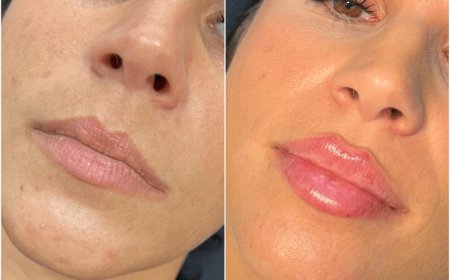Allergy Urgent Care vs ER: Where Should You Go in a Reaction Emergency?
Confused between allergy urgent care and the ER? Learn when to choose each for fast, effective treatment of allergic reactions and symptoms.
When allergy symptoms escalate quickly, it can be difficult to decide where to seek help. Should you rush to the emergency room or visit allergy urgent care? Understanding the difference between these two options can be the key to faster treatment, lower costs, and better health outcomes.
Why This Decision Matters
Allergic reactions vary in severity. From mild hives to potentially life-threatening anaphylaxis, each situation demands a different level of care. While the ER is essential for true emergencies, allergy urgent care often provides faster, more affordable, and specialized care for moderate symptoms.
Comparing Allergy Urgent Care and the ER
| Feature | Allergy Urgent Care | Emergency Room |
|---|---|---|
| Wait Time | Typically under 30 minutes | Can be several hours |
| Cost | Lower | Significantly higher |
| Staff Specialization | Allergy-focused | Broad emergency care |
| Ideal for | Moderate allergy symptoms | Life-threatening reactions |
| Appointment Needed | No | No |
When to Choose Allergy Urgent Care
Visit allergy urgent care if you experience:
-
Mild to moderate hives or skin rash
-
Nasal congestion, sneezing, and watery eyes
-
Local swelling after an insect sting
-
Mild asthma flare-ups due to allergens
-
Nausea or stomach discomfort from food allergies
These symptoms, while uncomfortable, usually do not require hospitalization but still need professional treatment.
When to Head to the ER
Go to the ER immediately if you notice:
-
Severe swelling of the face, lips, tongue, or throat
-
Difficulty breathing or wheezing that worsens rapidly
-
Dizziness, fainting, or low blood pressure
-
Chest pain or tightness
-
Full-body hives with a fast pulse
These signs may indicate anaphylaxisa life-threatening reaction that requires advanced emergency intervention.
How Allergy Urgent Care Treats Reactions
Allergy urgent care centers are well-equipped to manage many allergic responses. Treatments may include:
-
Oral or injectable antihistamines
-
Corticosteroids to reduce inflammation
-
Epinephrine for moderate reactions
-
Nebulizer treatments for allergy-induced asthma
-
Topical medications for rashes or hives
The Role of Epinephrine
Epinephrine is the first-line treatment for severe allergic reactions. While most allergy urgent care clinics are prepared to administer epinephrine, the ER remains essential for monitoring and managing complications that may arise afterward.
Cost Comparison
Medical bills can vary widely between the ER and allergy urgent care:
-
Allergy urgent care visits often cost between $100$250 (before insurance).
-
ER visits can exceed $1,000, not including treatment or hospitalization.
For non-life-threatening allergies, urgent care is the more cost-effective choice.
Real-Life Scenario: Choosing the Right Option
Imagine you eat a dish at a restaurant and start to feel your throat tighten. Youre not having difficulty breathing, but you notice swelling around your lips and a rash forming. This is a case for allergy urgent care.
But if your throat tightens further, breathing becomes difficult, or you feel faint, its time to call 911 or go to the ER immediately.
Accessibility and Wait Times
Allergy urgent care centers often provide:
-
Walk-in appointments
-
Shorter wait times than the ER
-
Extended hours, including evenings and weekends
-
On-site pharmacies or prescriptions for allergy medications
ERs handle trauma and critical cases first. If your allergic reaction is moderate, you may have to wait hours to be seen.
Follow-Up Care
After your symptoms are treated at allergy urgent care, you may be given:
-
A prescription for antihistamines or steroids
-
An epinephrine auto-injector if necessary
-
An action plan for future reactions
-
Referrals to allergy specialists for testing and long-term care
Prevention Is Still the Best Approach
Understanding your allergy triggers can prevent emergencies in the first place. Be proactive by:
-
Carrying emergency medications
-
Reading food labels carefully
-
Avoiding exposure to known allergens
-
Wearing a medical ID bracelet
Conclusion
Choosing between allergy urgent care and the ER depends on the severity of your symptoms. For mild to moderate reactions, urgent care is fast, focused, and more affordable. But for signs of anaphylaxis or severe respiratory distress, dont hesitatego to the ER.
Recognizing the signs and knowing your options ensures you get the right care, at the right place, at the right time.
FAQs
Q1: Is allergy urgent care equipped to handle serious reactions?
A: Yes, they can handle moderate to severe reactions, but extremely serious symptoms still require ER care.
Q2: Will allergy urgent care give me an epinephrine auto-injector?
A: If deemed necessary, they may prescribe one and demonstrate how to use it.
Q3: Can allergy urgent care provide a diagnosis of my allergy?
A: They can treat symptoms and refer you to an allergist for testing and long-term management.
Q4: What should I do if I'm unsure whether to go to the ER or urgent care?
A: When in doubt and symptoms are escalating quickly, it's safest to go to the ER.
Q5: Does insurance cover allergy urgent care visits?
A: Most insurance plans cover urgent care, but its best to confirm with your provider beforehand.









































